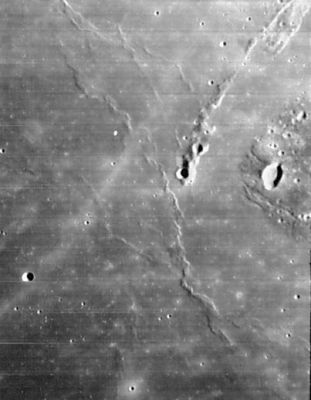Difference between revisions of "Dorsa Burnet"
| Line 6: | Line 6: | ||
|} | |} | ||
<div id="toc"> | <div id="toc"> | ||
| − | [http://www.lpod.org/coppermine/displayimage.php?pid=1810&fullsize=1 [[Image: | + | [http://www.lpod.org/coppermine/displayimage.php?pid=1810&fullsize=1 [[Image:Normal_Dorsa_Burnet_LO_iv_163_h1.jpg|external image normal_Dorsa_Burnet_LO_iv_163_h1.jpg]]]<br /> ''[http://lpod.org/coppermine/displayimage.php?pos=-1810 LOIV 163 H1]'' The bright arc of elevated material running diagonally into the frame from its upper right corner is [[Montes%20Agricola|Montes Agricola]]. Below it is the western edge of the [[Aristarchus%20Plateau|Aristarchus Plateau]], with the prominent crater [[Raman|Raman]]. '''Dorsa Burnet''' is the ridge system that runs cross-ways to '''Montes Agricola''', just off its southern tip. The converging ridges just above '''Montes Agricola''' are part of the separately named [[Dorsa%20Whiston|Dorsa Whiston]].<br /> <br /> |
==Images== | ==Images== | ||
[http://www.lpod.org/coppermine/thumbnails.php?album=search&type=full&search=Dorsa%20Burnet LPOD Photo Gallery] [http://www.lpi.usra.edu/resources/lunar_orbiter/bin/srch_nam.shtml?Dorsa%20Burnet%7C0 Lunar Orbiter Images]<br /> | [http://www.lpod.org/coppermine/thumbnails.php?album=search&type=full&search=Dorsa%20Burnet LPOD Photo Gallery] [http://www.lpi.usra.edu/resources/lunar_orbiter/bin/srch_nam.shtml?Dorsa%20Burnet%7C0 Lunar Orbiter Images]<br /> | ||
Latest revision as of 01:47, 16 April 2018
Contents
Dorsa Burnet
|
Lat: 28.4°N, Long: 57.0°W, Length: 194 km, Height: km, Rükl: 18 |

LOIV 163 H1 The bright arc of elevated material running diagonally into the frame from its upper right corner is Montes Agricola. Below it is the western edge of the Aristarchus Plateau, with the prominent crater Raman. Dorsa Burnet is the ridge system that runs cross-ways to Montes Agricola, just off its southern tip. The converging ridges just above Montes Agricola are part of the separately named Dorsa Whiston.
Images
LPOD Photo Gallery Lunar Orbiter Images
- AS15-88-12003 is one of Apollo 15's most remarkable orbital Hasselblads, because it is perhaps the most "western" one! It shows craters Schiaparelli (near centre) and Seleucus (near the upper right corner) in Oceanus Procellarum, and also Dorsa Burnet (lower half of image) near the (invisible) Aristarchus plateau. Looking south. - DannyCaes Dec 14, 2007
Maps
(LAC zone 38B1) LAC map Geologic map LM map LTO map
Description
Description: Wikipedia
Additional Information
- The position and diameter given in the title line are taken from the IAU Planetary Gazetteer. They seem to place Dorsa Burnet a bit too far to the north, as the circle so described would completely encompass the neighboring (and more northerly) Dorsa Whiston.
Nomenclature
- Named for Thomas Burnet (c. 1635? - September 27, 1715), a British Earth scientist, theologian and writer on cosmogony. His literary fame rests on his Telluris Theoria Sacra, or Sacred Theory of the Earth, published about 1692. In this book he suggested that the earth was a perfect hollow sphere with most of the water inside until Noah's Flood, at which time mountains and oceans appeared.
- Dorsa Burnet was among 120 names approved by the IAU in 1976 "as assigned" on the NASA LTO charts (IAU Transactions XVIB).
- An officially unnamed sinuous rille immediately west of Dorsa Burnet is called Rima Burnet by D.Caes. This rille is not mentioned in Debra Hurwitz's Atlas and Catalog of Sinuous Rilles.
LPOD Articles
Bibliography
- Dorsa Burnet and the western part of Montes Agricola:
- APOLLO OVER THE MOON; A VIEW FROM ORBIT, Chapter 4: The Maria (Part 2), Figure 72.